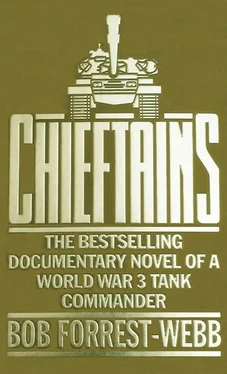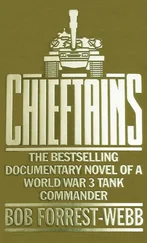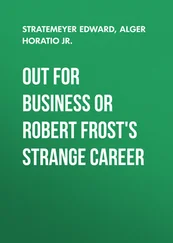Ginsborough nudged Browning’s arm urgently, and whispered, ‘Out there…’
Browning could hear noises on the hill twenty meters away, the rolling of a small stone through frost-dried leaves, the snapping of a thin twig. He aimed his Remington into the darkness, and eased off the safety catch.
An off-key blackbird whistled an unlikely first two bars of ‘John Brown’s Body’, and the scuffling on the slope above them increased.
‘Podini?’ It had to be!
‘Who else?’
‘You gink,’ swore Ginsborough, the tension had made him feel sick.
‘Will said half after nine, and it’s half after,’ hissed Podini.
‘What did you see going on over there? Browning asked.
Podini’s eyes glinted, catching the light of the rising moon. ‘Same as Mike said. They’re still building up. Man, some heavy stores!’
‘Like what?’
‘Rear service equipment. About twenty MAZ cargo carriers… fifteen tanners… ammunition I’d reckon, by the way they spaced them out. Plenty of trucks.’
‘Any armour?’
‘Nope… some artillery on the other side, waiting to get across. There’s an MTU laying another bridge. That’ll make three.’ He paused and then said casually, ‘I saw a nuke.’
‘A nuke?’ It was Adams, incredulously. ‘A nuke missile? You’re kidding!’
‘How d’you know it was a nuke? demanded Browning.
‘I don’t know. All I know is that it was one hell of a rocket.’
‘How long?’
‘I’m guessing… it ain’t too easy to see down there. Maybe ten meters, a big eight-wheeled transporter like a fire truck.’
‘It’s probably a Frog-7,’ said Browing, ‘with a conventional warhead.’
‘You and your fucking nuke,’ grunted Ginsborough. Podini seemed determined to make him throw up his rations.
‘Okay, let’s move out,’ ordered Browning. He wanted to get clear of the open ground before the moon rose any higher.
Gunthers was still smouldering, burning in places when the light brae stirred up ashes and fanned new life into the embers. Rubble spread across the streets from shattered houses and stores. The volunteer Bundesgrenzshutz infantrymen who had defended it with their Dragon and Milan missiles had drawn heavy artillery and tank fire, and because most were local men defending their own homes, they had fought bitterly. The bodies of many of them now lay amongst the ruins, but the wreckage of the Soviet tanks, twisted and blackened hulks in every street, was evidence of the ferocity of the battle.
Browning was feeling despondent. Now he was away from the Abrams, it seemed even more unlikely it could ever be repaired. Maybe it was best to write Utah off, and try to make it back on foot even though it might be difficult. The smell of war and death was getting through to him; it had done so at times in Vietnam. It was familiar, a recurring sickness that made him ill for a time, and like ‘flu he would get over it. Only there was no medicine he could take to ease his present discomfort. The only rapid cure he knew was in a bottle on the shelf of a bar, in some town as remote from war as maybe Las Vegas.
Adams was a few meters ahead, flattened against a crazily tilted wall that was overhanging the sidewalk. He was signalling frantically with his arm. When Browning reached him, he jerked his head towards the interior of the wrecked building. Browning listened. For a few moments he could hear nothing, and then there was a faint scratching sound.
Browning whispered: ‘Civilians, leave them.’
‘Maybe they can help us.’ Adams dropped to his knees and crawled over the rubble into the darkness.
‘Come back you damn fool,’ hissed Browning, but Adams ignored him. Browning squatted beside the doorway, his automatic ready; behind him Podini and Ginsborough waited tensely.
Adams was gone a full minute before he reappeared. ‘I was right,’ he said, ‘it’s a woman and some kids.’
‘If they’d been Russians, you’d have got us all killed,’ said Browning angrily. ‘Don’t ever do that again.’
‘They can help.’
‘ Maybe they can help!’
It was a few moments before his eyes became accustomed to the darkness of the shelled building, then he saw them, huddled together in a narrow wedge of open space between a fallen wall and a staircase — a middle-aged woman and three young children.
The woman asked nervously, ‘ Soldat… Amerikanish?’
‘Yes, ma’am.’
’Gott sei Dank.’
‘Don’t thank me yet, there are only four of us. D’you speak English?’
‘Bitte… verstehen sie nicht!’
‘I can speak.’ It was one of the children, a boy of about twelve, pale beneath the grime of brick dust that coated him.
‘We’re an American tank crew,’ explained Browning. ‘We got outselves knocked out this afternoon near the river. We need repair equipment. Can you show us where there’s a garage.’
‘All garage is bombed,’ said the boy, staring at him.
‘We know they’re bombed, son. We’re not looking for service. We need a metal cutter… a gas cutter… you know gas, big fires, very hot!’
‘Gas… I think I know.’ The boy spoke quickly to the woman but she simply shrugged her shoulders. ‘I come show you.’
‘What about your mom?’
‘Not mother… I come with you.’
‘Okay,’ agreed Browning. ‘But you tell this lady to stay put. We’re the only Americans there are around here. If she hears anyone else, they’re probably Russians.’ He saw the fear in the woman’s eyes as he turned away. He followed the boy to the doorway, then stopped and walked back towards her. He raised his automatic.
She misunderstood his action, twisting herself sideways to protect the two children beside her, shielding them with her body.
Browning spoke gently. ‘It’s okay, lady. Here…’ He reversed the pistol in his hand and held the butt towards her.
She relaxed, then smiled guiltily. She took the weapon slowly, then placed it in her lap. ‘ Danke.’
‘Good luck.’
There was something wrong; Browning could sense it. It was the feeling that things had somehow got beyond his control. The boy was hurrying them despite Browning’s warning there might still be enemy soldiers in the area. As they moved into a broad alley between two old half-timbered barns, he realized it was a trap. The boy suddenly dived behind a pile of rubble, and shouted loudly. There was a quick burst of automatic rifle fire from the darkness ahead, the bullets hissing past them.
Podini was already firing as the men dropped, the crisp sounds of his Remington echoing from the high walls on either side. Bullets from the automatic rifle were ricochetting from the brickwork.
The boy was shouting again, his words punctuating the rifle shots.
‘Jesus Christ,’ Ginsborough swore beside Browning, ‘the lousy little fucker.’
Browning’s German wasn’t much good, but he’d understood enough to hear the boy yell that they we Russians and still alive. If they were supposed to be Reds and someone was firing at them, then whoever was at the other end of the rifle was likely to be a friend. He called out, ‘We’re Americans… Americans…’
The shooting ceased but then nothing happened for a few moments until a voice said, ‘Stand slowly. With your hands up.’
‘Real slow,’ Browning warned the crew. He stood, cautiously. Out there in the darkness someone: had him in their sights. A slight twitch of a finger and he would be blown away.
‘Put your weapons down,’ said the voice.
‘They’re down.’
There was movement. Browning thought he could see several men at the far end of the alley. A barrel glinted in a window a few meters above them.
Читать дальше












